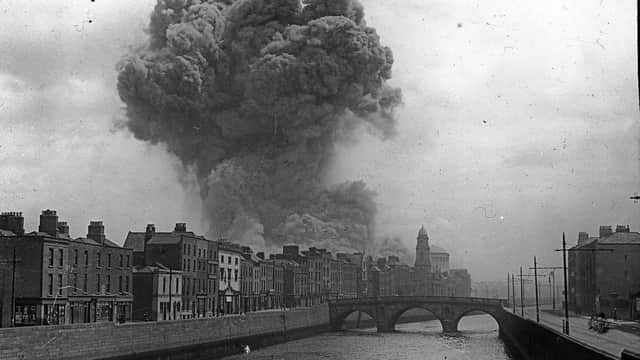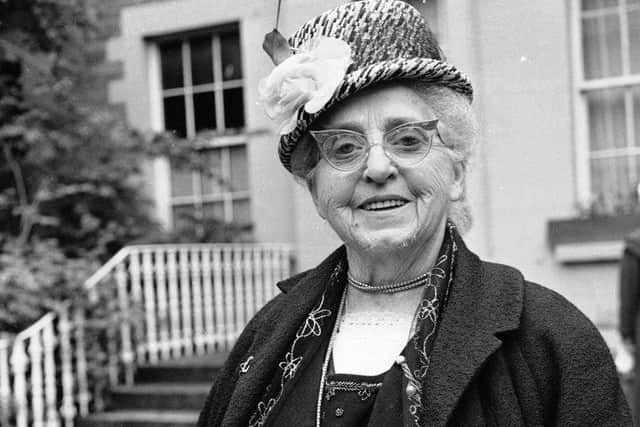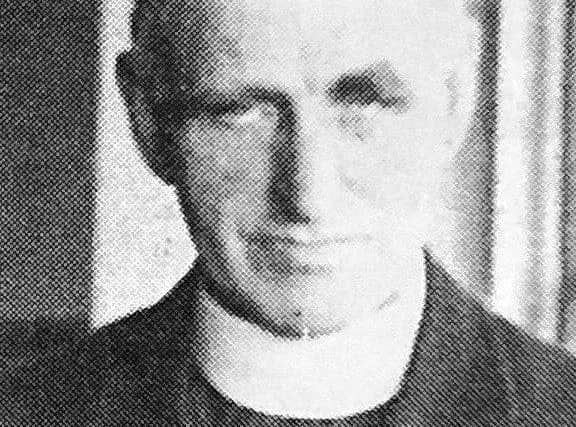Feis Doire Colmcille: a century of culture from a city of music, song and dance


For one hundred years, Feis Doire Colmcille has been the gilt-edge stitching that has helped bind the cultural fabric of this city and its hinterlands together.
Across the decades, the institution has become virtually synonymous with Easter Week. However, the inaugural feis ran over four nights between Tuesday, June 27 and Friday, June 30, 1922. The decision to stage the first ever event was made earlier in the year as political turmoil gripped the island.
Advertisement
Hide AdAdvertisement
Hide AdIn fact, as the third day of competitions at the maiden Derry Feis got underway, it was being reported that Dublin’s Four Courts were being shelled. The threat of civil war that had been looming over Ireland was no longer a threat. It had begun in earnest. And, as the feis drew to a close on that mid-summer Friday night, it was being reported that O’Connell Street was a smouldering mess. In fact, Derry itself stood on the brink of becoming embroiled in the fight between pro and anti-Treaty republican factions.


The Derry Journal editorial of Friday morning June 30, 1922 put the state of the country at that time sharply into focus.
It read: “The first thought that must arise in the minds of all patriot Irishmen whose newspapers reveal to them the tidings of the deadly conflict will, we believe, be one of profound melancholy. It is saddening in supreme degree to find that things have come to such a terrible pass that two sections of fellow countrymen have had to turn guns upon one another with resultant loss of life and personal injury that are deplorable.”
Nevertheless, despite the dreadful events that were witness to its birth, the first feis proved a cultural and competitive triumph. The benchmark for the following century of high-grade competition and entertainment had been well and truly set.
Advertisement
Hide AdAdvertisement
Hide AdArthur Darley, a renowned musician who masterfully strode the gap between classical and traditional Irish music, was amongst the first adjudicators to preside over some of the competitions. He contended that, if the standard he had witnessed at the first feis could be maintained, he foresaw that Feis Doire Colmcille would not only become the greatest Gaelic festival in Ulster but in all of Ireland.


Derry Feis, however, had a noted and highly respected predecessor.
Just over twenty years earlier, in 1900, Mrs Alexandrina McCausland Stewart had founded Londonderry Feis. An acclaimed singer herself and from a highly prestigious musical background, one of the highlights of her own career was her performance with the renowned Halle Orchestra at St Columb’s Hall during feis week in 1914. Having been in Derry since 1898, when her husband suddenly passed away, Mrs Stewart returned home to her family in Dublin.
The pioneer of the feis movement in the city, however, returned each year to take in the competitions, was accorded the honourary title of ‘Administrator’ and received an offer from the feis committee that they would pay her travel expenses to the city each Easter.
Advertisement
Hide AdAdvertisement
Hide AdThe early decades of the twentieth century had seen the Gaelic revival reach Derry in strength and the Gaelic League which spearheaded that renaissance quickly established a strong and enthusiastic presence. The city even had its own Coiste Ceanntair – district committee.
The Irish language was taught in schools and each summer students went to the Ulster Gaelic College at Cloughaneely, close to Falcarragh in Co. Donegal. The full gamut of the League’s Irish-Ireland programme was embraced and included language classes, debates, lectures, choirs, dramatic performances, music and dancing. The sum of all these parts was brought together in acclaimed public concerts each year in the Gaeltacht areas of Donegal.
But with the partition of Ireland in 1921 came a drive to preserve Irish traditions from being subsumed into, or permanently expunged by, British cultural traditions that came to prominence with the creation of Northern Ireland.
The Derry Journal took a very clear view on this and the paper latterly offered a very robust opinion on the effect that partition had taken on Londonderry Feis.
Advertisement
Hide AdAdvertisement
Hide AdIn 1946, the Journal’s ‘Onlooker’ column looked back to major local events almost 25 years earlier and contended: “When the late Mrs Alexandrina McCausland Stewart founded the Londonderry Feis, she realised that she could not get on without the Gaelic League. She invited and received its co-operation, it had a representation on the committee, it presented a trophy that, ironically enough, is still up for competitions, and its competitors proved their worth at each annual festival.
“With the departure of Mrs Stewart from Derry, the whole character of the Londonderry Feis changed. It became British instead of Irish, the Irish language was relegated to obscurity and its sessions concluded with the English National Anthem. Today its antipathy to everything Irish is so open as well as so pronounced that a notice, prominently printed on the first page of its programme, states: ‘All vocal music must be sung in the English language, except Church music, which may be sung in Latin.’
“The Gaelic League, of course, withdrew from the committee and its members from the Londonderry Feis, which henceforth became an affair of the garrison of occupation.”
Back in 1922, and now deprived of the chance to compete, the musically talented members of the Gaelic League were confined to the aforementioned concerts held by their own organisation.
Advertisement
Hide AdAdvertisement
Hide AdThen, at a meeting of the Derry Coiste Ceanntair at the start of 1922, Fr Peadar McLoingsigh, Parish Priest at Aghyarran, proposed holding a feis of their own. The suggestion was well received, but others thought that the timing of the event wasn’t good because the storm clouds of civil war were gathering over Ireland rapidly. Many Gaelic League members were involved in support for or against the Anglo-Irish Treaty signed just a few weeks previously in December 1921.
The Derry Journal reported: “Father Peadar, however, was not dismayed. In spite of the times, perhaps rather by reason of them, he had faith in his idea and he soon inspired the whole Coiste with his enthusiasm. It was decided to hold a feis, call it Feis Doire Colmcille and to appoint a committee to draw up the syllabus.”
Known as a fastidious and enthusiastic organiser, Fr John Logue McGettigan became the first secretary of the feis. Mrs Edward Henry O’Doherty (Rose) was appointed as chair and it was her job to draw up the musical competitions.
Rose O’Doherty was born in Derry in 1879 and was taught the piano at an early age by her mother. As a child, she received formal musical education at Boscombe College in Bournemouth before returning to Derry. In 1904, she married wealthy merchant Edward Henry O’Doherty and she famously coached singers and pianists at their home.
Advertisement
Hide AdAdvertisement
Hide AdAs Feis Doire Colmcille became established as one of the foremost musical festivals on the island, ‘Mrs E.H.’, as she was known, came to be regarded as a very accomplished figure and a well-known name in musical circles across the country. It was, perhaps, then that Rose established her own tradition of buying a new hat every year when she played her part as piano accompanist at the feis. It is said that the appearance of her new hat was as eagerly anticipated as some of the competitions themselves.
Mrs O’Doherty passed away in 1969 at the age of 90. Her contribution to Irish music and the legacy she bequeathed to the cultural life of her birthplace was recognised in March 2018 when the Ulster History Circle erected one of its famed blue plaques outside her former Francis Street home.
The Derry Journal said of both Rose O’Doherty and Fr McGettigan: “The story of Mrs O’Doherty is the story of Irish music in Derry for almost half a century. She was its soul and its centre and, if Feis Doire Colmcille has grown into the mighty thing that it is today, it is to her and Fr McGettigan that the greater credit is due.”
Until this day, the music competitions at Derry Feis have prizes named after Fr McGettigan and Rose O’Doherty.
Advertisement
Hide AdAdvertisement
Hide AdIf you wanted to quickly establish the strength of a festival of music, song and dance, there was no better way to do this than to employ the finest experts available to give their opinions on the standard of the performances.
Joining Arthur Darley in the adjudication of music at Feis Doire Cholmcille was Dr Annie W Patterson and Dr John Francis Larchet. The dancing competitions were presided over by Mr Sean Best, of Belfast, and the Irish language programme was judged by Anthony O’Doherty, of Falcarragh.
Perhaps best known among the list of adjudicators was Dr Larchet. His many achievements included being musical director at the Abbey Theatre from 1908-1935. His work there included providing the music to accompany the plays of the Irish literary renaissance, in particular those of W.B. Yeats.
As such, he was well placed to comment on the success of Feis Doire Colmcille, founded as it was on the principles of the Irish cultural revival. Speaking of what he had experienced during the first feis, he said: “Of what I have heard, I would say that Dublin would have to wake up or come to Derry to be awakened.”
Advertisement
Hide AdAdvertisement
Hide AdIn the last century, the institution of Derry Feis has been globally recognised as the symbolic cradle from where world renowned stars of music, drama, singing and dance have taken their first tentative steps into the world of performance.
It is, perhaps, the only forum in the world where the music of Beethoven, Mendelssohn, Mozart, Chopin and Schubert sit easily alongside the melody of a jig, reel or hornpipe; where Shakespeare’s sonnets are recited with the same passion as an ancient Gaelic poem, and are often told by the same competitor. It is where an instrumentalist is seen bolting from a competition room into a bathroom only to emerge minutes later bedecked in an Irish dancing costume to rush onto another stage.
Around seven hundred entrants competed across the various disciplines on offer in 1922. By the 1990s, the feis was accommodating almost 7,000 entrants and had long since spilled out into venues away from its first and beloved home of the Guildhall.
At various times, all the main rooms within St Columb’s Hall, the Rialto, the Playhouse, A.O.H hall on Foyle Street and the former St Eugene’s Parish Hall (Stardust) were put to good use. The former Calgach Centre on Butcher Street was also used. In recent years, St Mary’s College on Northland Road has hosted choir competitions.
Advertisement
Hide AdAdvertisement
Hide AdAt the close of each feis, there was still another event to look forward to. The Prizewinners Concert provided a chance not only for the successful competitors to again showcase their talent but for everyone from across all the disciplines to admire and appreciate the efforts of their counterparts. Such was the demand for a seat at these concerts that, on occasion, they were broadcast live on the fledgling BBC Radio Ulster.
Many of the city’s finest and internationally known performers have graced the stages of Feis Doire Colmcille down the years. Among them are Dana, Phil Coulter, Feargal Sharkey, Jimmy McShane (Baltimora) Roma Downey, Nadine Coyle, Bronagh Gallagher, Mairead Carlin, Margaret Keys, Gerard McChrystal, Frank Gallagher, Ruth McGinley and Cathal Breslin.
None of the above mentioned names would have gone forward without the help of legendary feis figures such as James MacCafferty, Donald O’Doherty, George Kilkie and Paddy McCafferty who accompanied them musically. On the administrative side, many families have cumulatively given decades of their lives on a voluntary basis to help run the event.
Derry Feis has not only remained steadfastly dedicated to its founding and principle ethos of the preservation of all things culturally Irish, but it has also provided an outlet for as many children as possible to sample performing.
Advertisement
Hide AdAdvertisement
Hide Ad○ In coming weeks, the Derry Journal will recount the thoughts and memories of many former Derry Feis competitors.
○ Meanwhile, registration for this year’s Feis will take place at The Playhouse, Artillery Street on Friday and Saturday, February 4 and 5, at 10am to 12pm and 2pm to 5pm.